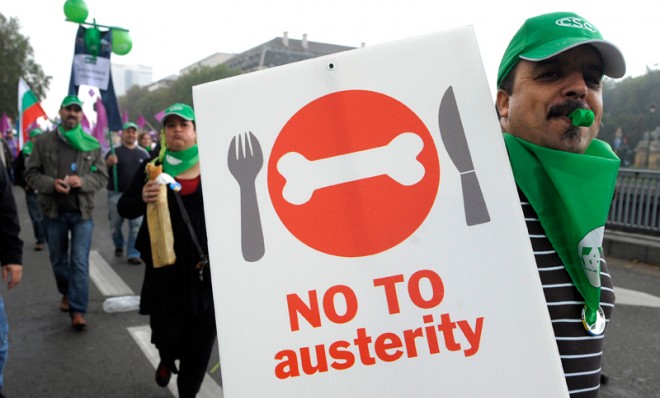Is Europe's economy finally on the rebound?
After six years of pain, things may be looking up

A free daily email with the biggest news stories of the day – and the best features from TheWeek.com
You are now subscribed
Your newsletter sign-up was successful
After six years of economic distress — featuring skyrocketing unemployment and stagnant growth — Europe might finally be ready to rebound.
The European Commission, the executive body of the European Union, says the 27-nation economic bloc could start recovering as early as the fourth quarter of this year, and predicts it could expand by 1.4 percent in 2014 — not exactly record growth, but not completely dismal either.
A handful of factors point to a rosier outlook. The euro zone's purchasing managers' index, an indicator of economic health in the manufacturing sector, crept up to 48.8 in June, slowly approaching 50, the threshold that signals expansion.
The Week
Escape your echo chamber. Get the facts behind the news, plus analysis from multiple perspectives.

Sign up for The Week's Free Newsletters
From our morning news briefing to a weekly Good News Newsletter, get the best of The Week delivered directly to your inbox.
From our morning news briefing to a weekly Good News Newsletter, get the best of The Week delivered directly to your inbox.
Meanwhile, retail and housing markets in the U.K., which just barely avoided an unprecedented triple-dip recession, seem to have a new lease on life. Germany, the continent's economic powerhouse, is still going relatively strong. Though it won't release specifics until August 14, Germany's central bank says recent data indicates the country's economy "expanded strongly" in the second quarter, lead by growth in industry and construction.
The EC even thinks that Spain, an utter basket case, could expand by 0.9 percent next year.
Driving the change, says Jonathan Buck at Barron's, was the European Central Bank's decision to ease up on some austerity measures, and start a bond-buying program similar to the one deployed by the U.S. Federal Reserve.
Much of the credit for restoring stability in Europe lies with the ECB and its president, Mario Draghi. The implementations of a bond-buying mechanism to bring down market interest rates, and a pledge last summer by Draghi to do "whatever it takes" to defend the euro, effectively have doused the threat that any sovereign-debt crisis would spread.
Whatever Draghi does next, he must avoid Federal Reserve Chairman Ben Bernanke's playbook, as any hint of tightening the money supply could upend the EU's delicate recovery. At the moment, the ECB shows no sign of changing course. It signaled earlier in July that it retains all options for further easing. "The umbrella that the ECB has been able to hold over the region is proving effective," says Michael Hood, global market strategist at JPMorgan Asset Management in New York. [Barron's]
Mark Thompson at CNN says the U.K. is "shifting up a gear," leaving other European countries in the dust. "Home prices are increasing at their fastest rate in more than three years, helped by ultra-low interest rates and government programs that encourage banks to lend and make it easier for riskier borrowers to buy a home," he writes.
A free daily email with the biggest news stories of the day – and the best features from TheWeek.com
But Portugal and Greece are still far from stable, and Germany might not be the stalwart it appears to be:
Just last week, the Greek Parliament narrowly passed a law to sack thousands of public sector workers and Portugal is struggling to meet the terms of its bailout. Southern Europe's woes have hit sentiment in Germany again, and combined with slower growth in China, are weighing on exports from the eurozone's top economy. [CNN]
Thompson, though, points to another factor buoying the U.K.'s economy: "Royal baby fever and a heat wave are helping drive spending."
Carmel Lobello is the business editor at TheWeek.com. Previously, she was an editor at DeathandTaxesMag.com.